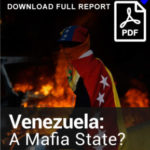The United States has called on the United Nations to revoke the U.N. credentials of the government of embattled Venezuelan President Nicolás Maduro and to instead recognize Juan Guaidó (above), the head of the National Assembly, Juan Guaido, as interim president.
Despite sanctions, Maduro clings to power with help from Russia, China and Cuba, AP reports. The international coalition that supports the opposition stands at 54 nations, although some longtime U.S. allies have refused to join the Trump administration in recognizing Guaido as interim president.
Maduro is closely tied to Putin’s corrupt regime, and Moscow recently sent 100 troops and 35 tons of supplies to Maduro, notes Ana Quintana, a Heritage Foundation analyst. By moving troops and supplies into Venezuela, Russia is signaling it intends to protect its investments in Maduro.
 As for China, the Venezuelan regime owes Beijing over $20 billion. While China’s interests are less ideological than the other countries, it does not share the region’s commitment to a democratic transition in Venezuela, adds Quintana, a former Penn Kemble fellow at the National Endowment for Democracy.
As for China, the Venezuelan regime owes Beijing over $20 billion. While China’s interests are less ideological than the other countries, it does not share the region’s commitment to a democratic transition in Venezuela, adds Quintana, a former Penn Kemble fellow at the National Endowment for Democracy.
Lima Group nations have taken in hundreds of thousands of refugees fleeing Venezuela’s economic collapse and have issued statements condemning Maduro but done little else, said Benjamin Gedan, a Latin America expert at the Wilson Center, a Washington think tank specializing in global issues.
“The Lima Group has mostly threatened coordinated sanctions but hasn’t carried them out,” he said. “They have exhausted the diplomatic route.”
 Maduro has been a catastrophe for Venezuelans, and the U.S. is right to join Canada and more than 50 other countries in recognizing the head of the National Assembly, Juan Guaidó, as the legitimate leader of Venezuela, says New York Times commentator Nicholas Kristof.
Maduro has been a catastrophe for Venezuelans, and the U.S. is right to join Canada and more than 50 other countries in recognizing the head of the National Assembly, Juan Guaidó, as the legitimate leader of Venezuela, says New York Times commentator Nicholas Kristof.
In the best-case scenario, the current humanitarian aid agreement could serve as a model for how international actors can facilitate a democratic transition, Tulane University’s David Smilde writes in Venezuela’s power struggle reaches a tense stalemate, as human suffering deepens.
 Michael McCarthy, a research fellow at American University’s Center for Latin American and Latino Studies, likened the impatience to Guido’s followers and nervous neighbors “tapping their fingers” and wondering, “When is this going to translate into what we designed it for?”
Michael McCarthy, a research fellow at American University’s Center for Latin American and Latino Studies, likened the impatience to Guido’s followers and nervous neighbors “tapping their fingers” and wondering, “When is this going to translate into what we designed it for?”
“It’s a problem of managing expectations,” said McCarthy, editor of the Caracas Wire. “This struggle is going to require sustained pressure and optimism and, without concrete gains along the way, the base of the opposition may grow disenchanted.”







